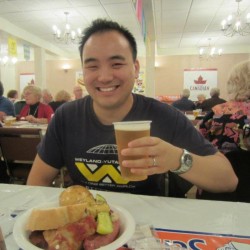Dr. Yunghan Au

Describe your education and training at UHN.
For my undergraduate degree, I studied Biochemistry at Imperial College London. My field of research was Structural Biology for my PhD at University College London, where I studied muscle proteins. Next, I did a postdoc in Dr. Mitsu Ikura’s lab at OCI, where I studied proteins involved in DNA transcriptional regulation. My project at OCI involved a combination of molecular and structural biology to investigate how proteins in the mediator complex interact to control transcription. It was fun to work within such an international institution and I was glad to have access to the world-class facilities at OCI and U of T. After returning to the UK to work in sales for Life Technologies, I studied for my MBA at the University of Cambridge.
What is a Patient Access Associate?
Our department’s mission is to enable patients to gain access to the innovative medications Lilly creates from our R&D by seeking reimbursement by public/private payers. To achieve this, we submit a “Health Technology Assessment” dossier for each medication to the appropriate government agency or health insurer. These groups then decide whether or not to fund our medications based on our submission. Currently, I am working on gaining access for our cancer medications.
What is a typical day like for you?
I spend a lot of time researching the burden of disease and how it is currently treated with the aim of understanding how our medications fit in to the current standard of care in Canada and their potential benefits. I do a lot of project management and long-term and short-term planning. One of my current projects is to examine the current standard of treatment in Canada for pancreatic cancer, with the aim of guiding our clinical research scientists in the design phase III clinical trials such that once these studies are complete they will yield relevant results within Canada. Other than that, lots of meetings, emails and general office work!
What is the best part of your job?
Working in a company that truly cares about the needs of our patients and is devoted to improving their lives through innovation. Also, working with the talented people at Lilly Canada; it’s been great to converse with cross-functional teams that include medics, pharmacists, seasoned marketers and communicators—people who are all working together to develop products that have the potential to improve patient quality of life.
What is the worst part of your job?
Knowing that healthcare equity is not a reality in Canada with regards to access to medications. Coming from the UK, all medications are covered on the NHS where everyone has equal coverage. I am glad to be part of the mission to address this disparity for Canadians.
Any advice for trainees interested in pursuing a career in this field?
This path requires a good mix of scientific/medical knowledge with a fair bit of business thrown in. Keep an open mind as to how you will gain the experience from both an educational and experiential perspective – moving up the academic ladder is relatively straight-forward, while in business is less so. Also, remember that soft skills are the hardest to gain!

